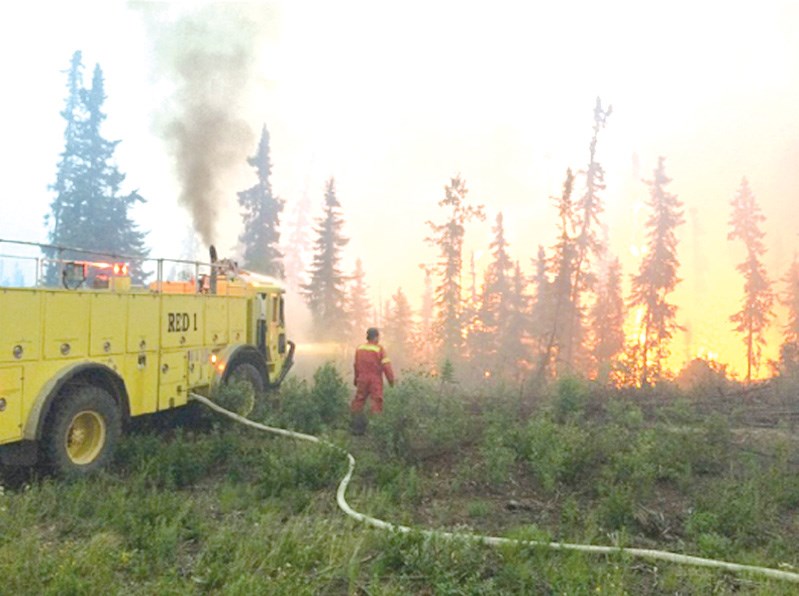All information in this article is current as of July 6.
As the wildfires in northern Saskatchewan continue to spread, the federal government is getting involved by providing about 1,000 members of the military to get trained and help contain the fires.
“It’s a very volatile situation. Conditions change on a regular basis,” said Duane McKay, commissioner of emergency management with the province.
This past weekend, the community of La Ronge was evacuated. To pose a significant threat and prompt evacuation, the fire has to be within 20 kilometres of a community. As of Monday, the fire was about three kilometres away from La Ronge.
“We’re fairly confident it (the fire entering La Ronge) won’t happen today,” said Scott Wasylenchuk, the provincial fire centre manager. “It depends on how well we can adapt to the weather changes … we’re doing everything we can to mitigate that scenario.”
The province has requested federal assistance. As of July 6, 600 soldiers were set to arrive in Prince Albert that day, and be trained as forest firefighters. The remainder were expected a day after that. They will receive basic forest fire training, which includes operating the hose, fire behaviour science, ground safety, and more.
“(They will receive) the basic type of training a firefighter has to receive before we will put them on a wildland fire,” said Colin King, deputy commissioner of emergency management.
The majority of the troops are coming from Alberta and Manitoba.
Right now, there are no hard numbers released as to the cost of the firefighting efforts.
“Our priority has been focused on containment,” McKay said.
However, records are being kept to tally cost later.
“I feel quite confident that our organization has pulled together. There’s strong co-ordination between all involved,” McKay said. “It doesn’t mean the situation is under control. That means we have significant resources in place.”
Wasylenchuk said there have been 574 fires this year, compared to 205 last year.
“It’s been a significant fire season for us. It started early and has not let up,” he said.
On Monday, he said that nine fires started in the previous 24 hours. Over 100 fires were active, with 24 fires not contained, 13 contained, and 66 being assessed. Resources being used to fight the fires include aircraft from Quebec and Newfoundland and ground crews from Ontario, New Brunswick, Newfoundland, and South Dakota.
Volunteers are also coming from all over the province, including Humboldt.
As of Monday, no structures were lost in La Ronge itself and crews were working to keep the fire out of the community. However, about 12 structures have been burned in the fire, though they aren’t all necessarily permanent homes.
Wasylenchuk added that the wind is changing direction, which will blow the smoke and fire away from the communities and allow the firefighters to more effectively get in and fight the fires.
As of July 6, just over 7,000 people had been evacuated and actively sought assistance. This does not include those who were evacuated and stayed with family or friends. The majority of people have been sent to Regina, Saskatoon, and Prince Albert, with some also going to Cold Lake, Alta., and North Battleford.
Karri Kempf, manager of information and emergency services with the province, said it’s impossible right now to give an exact number for how many people have been evacuated.
Right now, the province is not asking for donations. This is because the volume would be too high and the resources aren’t there to process donations.
“The volume of donations coming in from this province would be staggering,” she said.
The evacuation does not include pets. Instead, the province has set up a schedule for people in the area to feed the pets. As well, other people in the area are caring for the infrastructure so that when the evacuees return, they can settle back in seamlessly.
“We know for certain there are a great number of these community representatives staying back in communities taking care of animals,” King said, and added that people who have been evacuated are aware their pets are being cared for.
Fire bans are in place for all northern provincial forests, as well as provincial parks and recreation sites within the forests. McKay said that nonessential people must stay away from the fires, as there have been people taking photos or thrill seeking.
“Those people do create a significant risk and concern to people who have to monitor (the fires),” he said. “A strong message here is if individuals don’t need to be in those areas, we ask they stay out.”
Any evacuees looking to locate someone can call 1-888-953-3463.




